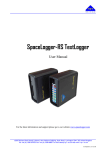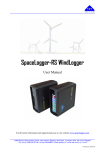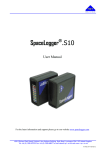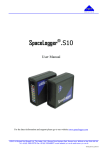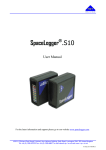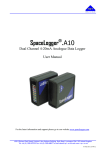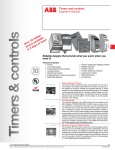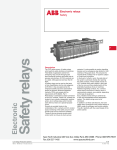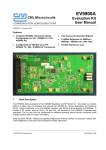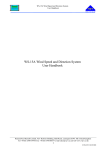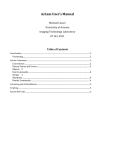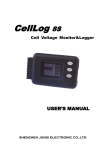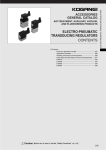Download SpaceLogger.T10 TextLogger User Manual
Transcript
SpaceLogger .T10
[TextLogger]
®
User Manual
For the latest information and support please go to our website www.spacelogger.com
©2007-2012 Richard Paul Russell Limited, New Harbour Building, Bath Road, Lymington SO41 3SE United Kingdom
Tel +44 (0) 1590 679755 Fax +44 (0) 1590 688577 e-mail sales@r-p-r.co.uk web www.r-p-r.co.uk
017SL007/7 22/10/12
SpaceLogger®.T10 [TextLogger]
User Manual
1
INTRODUCTION................................................................................................................... 2
2
QUICK START: EASY STEPS TO DATA LOGGING ............................................................ 3
3
EXAMPLE APPLICATION..................................................................................................... 3
4 CONNECTING ...................................................................................................................... 4
4.1
Terminal Strip Arrangement .............................................................................................. 4
4.2
Generic Terminal Allocations ............................................................................................ 4
4.3
RS232 Interface ................................................................................................................. 5
4.4
2400 Baud Rate Selection .................................................................................................. 5
4.5
Cable Preparation .............................................................................................................. 5
4.6
Power Supply .................................................................................................................... 6
5 SETUP FEATURES ............................................................................................................... 7
5.1
Baud Rate .......................................................................................................................... 7
5.2
Parity and Number of Data Bits ......................................................................................... 8
5.3
Format of the Stored Data.................................................................................................. 8
5.3.1 To Disable Any Modification of the Data .......................................................................... 8
5.3.2 To Translate all Input Characters to Their ASCII Hex Value ............................................. 9
5.3.3 To Enable Character Substitutions ..................................................................................... 9
5.4
Logic Inversion of the Received Signal............................................................................ 10
5.5
File Name Customisation................................................................................................. 10
5.6
To Output RS232 Data from the SpaceLogger.T10 .......................................................... 11
5.7
To Output a File containing the current SpaceLogger.T10 Settings .................................. 11
5.8
Resetting the SpaceLogger.T10 to Default Settings ......................................................... 12
5.9
SETUP.TXT file.............................................................................................................. 12
5.10 Notes on saving file SETUP.TXT .................................................................................... 13
6 LOGGING ........................................................................................................................... 14
6.1
SD Card .......................................................................................................................... 14
6.2
Data Transfer ................................................................................................................... 15
6.3
Data Storage .................................................................................................................... 15
7
SPACELOGGER.T10 (TEXTLOGGER) SPECIFICATION .................................................. 16
APPENDICES .............................................................................................................................. 17
A1
SETUP.TXT Commands ................................................................................................. 17
A2
ASCII – American Standard Code for Information Interchange ....................................... 18
A3
Guarantee ........................................................................................................................ 19
A4
Electromagnetic Conformity ............................................................................................ 20
A5
WEEE (Waste, Electrical and Electronic Equipment) Statement ...................................... 21
A6
RoHS Statement .............................................................................................................. 21
©2007-2012 Richard Paul Russell Limited, New Harbour Building, Bath Road, Lymington SO41 3SE United Kingdom
Tel +44 (0) 1590 679755 Fax +44 (0) 1590 688577 e-mail sales@r-p-r.co.uk web www.r-p-r.co.uk
-1017SL007/7 22/10/12
SpaceLogger®.T10 [TextLogger]
User Manual
1 INTRODUCTION
SpaceLogger®.T10 (TextLogger) receives data from RS232 compatible data sources and is
designed for simple data logging, supporting a range of ASCII text logging applications.
Data is stored onto an SD card. SD or MMC cards with up to 2 GByte capacity are compatible
with SpaceLogger®. Higher capacity cards are not compatible.
The SD card can be removed from the logger and inserted into a card reader connected to a PC.
Stored data files are accessed in the same way as files on the computer’s other disk drives. The
text files may be read and manipulated in any standard Office applications (e.g. Notepad or MS
Excel).
While the SpaceLogger.T10 is storing data on the SD card, it is also possible to output the
received RS232 data from the SpaceLogger.T10 to another device. Refer to section 5.6 for details.
The logger requires a 7 – 30 volt DC supply which can be provided by an AC/DC mains adaptor
or suitable battery.
Document revision summary
Issue
1
2
3
4
5
Date
Oct 2007
Nov 2008
Aug 2009
Oct 2009
April 2010
6
March 2011
7
Oct 2012
Description
Original document
Operating conditions updated
Baud rate selection detail added
Data output option added. New SpaceLogger images
Compatibility with alternative parity types and number of data bits
added. Option to disable any modification of the data added. Option
to translate all data to ASCII hex characters added.
Product name change from SpaceLogger-RS to SpaceLogger.
Reference new model number. No change to product.
Features updated. SETUP.TXT file commands modified.
Configuration now saved to memory.
Applies to units with serial numbers TL12-7468 and above
Our products are in continuous development and therefore specifications may be subject to change
and design improvements may be implemented without prior notice. Please visit our web site
www.r-p-r.co.uk for the most up to date information on our products.
©2007-2012 Richard Paul Russell Limited, New Harbour Building, Bath Road, Lymington SO41 3SE United Kingdom
Tel +44 (0) 1590 679755 Fax +44 (0) 1590 688577 e-mail sales@r-p-r.co.uk web www.r-p-r.co.uk
-2017SL007/7 22/10/12
SpaceLogger®.T10 [TextLogger]
User Manual
2 QUICK START: EASY STEPS TO DATA LOGGING
............. Connect RS232 inputs
............. Set up logging preferences with SETUP.TXT file
............. Power on
............. Insert SD card
............. Start recording data
see section 4
see section 5
see section 4.6
see section 6.1
see section 6.2
..............
............. Stop recording data
............. Remove card and transfer to PC to view and analyse data
see section 6.2
see section 6.2
3 EXAMPLE APPLICATION
SpaceLogger.T10
with RS232 link to
equipment
Manual transfer
of SD card to
PC card reader
Figure 1
©2007-2012 Richard Paul Russell Limited, New Harbour Building, Bath Road, Lymington SO41 3SE United Kingdom
Tel +44 (0) 1590 679755 Fax +44 (0) 1590 688577 e-mail sales@r-p-r.co.uk web www.r-p-r.co.uk
-3017SL007/7 22/10/12
SpaceLogger®.T10 [TextLogger]
User Manual
4 CONNECTING
4.1
Terminal Strip Arrangement
POWER
1
2
3
4
5
6
7
8
9
10
11
12
13
14
15
16
Figure 2
4.2
Generic Terminal Allocations
SpaceLogger
Terminal
1
2
3
4
5
6
7
8
9
10
11
Signal description
Power GND
Supply +V (+7 to 30V dc)
Analogue GND 1
Analogue input 1
Analogue GND 2
Analogue input 2
Digital I/O GND 1
Digital I/O input 1
2400 baud rate selection
Digital I/O GND 2
2400 baud rate selection
Digital I/O input 2
GND
12
13
14
RS232 Tx 2
RS232 Rx 2
RS232 output 1
15
16
RS232 input 1
RS232 GND 1
Use
Power
Reserved for future
options
Baud rate
RS232 signal output
(in Debug mode)
Reserved for future
options
RS232 signal output
(in Debug mode)
RS232 signal input
from data source
Table 1
©2007-2012 Richard Paul Russell Limited, New Harbour Building, Bath Road, Lymington SO41 3SE United Kingdom
Tel +44 (0) 1590 679755 Fax +44 (0) 1590 688577 e-mail sales@r-p-r.co.uk web www.r-p-r.co.uk
-4017SL007/7 22/10/12
SpaceLogger®.T10 [TextLogger]
User Manual
4.3
RS232 Interface
RS232 connection to the data source should be made as per Table 1. This table should be read in
conjunction with Figure 2. Wires should be prepared as per section 4.5.
4.4
2400 Baud Rate Selection
The default baud rate is 9600 bits per second. If an input baud rate of 2400 is required, terminals 9
(blue) and 10 (yellow) could be linked as per Figure 3 below.
Terminal linking for 2400 baud rate
POWER
1
2
3
4
5
6
7
8
9
10
11
12
13
14
15
16
Figure 3
Alternatively, to configure the SpaceLogger.T10 for other baud rates (selectable from 115200,
57600, 38400, 19200, 9600, 4800, 2400, 1200, 300 and 110 bits per second) use file SETUP.TXT
as described in section 5.1.
Limitations: Please note that although the SpaceLogger.T10 can be set to communicate at higher
baud rates than the default 9600, the internal buffer size and the speed at which it is able to write
to the memory card limits the total throughput. Possible data loss can occur with continuous data
at high baud rates.
4.5
Cable Preparation
The logger uses screwless terminals and to ease connection, wires should be prepared as per
Figure 4. It is important that the stripped ends be accurately 9 to 10mm long to ensure good
connections in the terminals.
9 to 10mm
Tinned end
Figure 4
Either solid or stranded cable is acceptable, in the range 0.32 to 0.65 mm diameter (AWG 28 to 22)
with gauge 24 being ideal.
Using a small flat headed screw-driver fully depress the grey plunger for the required terminal and
insert the wire as far as it will go, into the hole below the plunger. Release the grey plunger and
the wire is held captive by the connector. A gentle tug on the wire will confirm that it is held
firmly.
©2007-2012 Richard Paul Russell Limited, New Harbour Building, Bath Road, Lymington SO41 3SE United Kingdom
Tel +44 (0) 1590 679755 Fax +44 (0) 1590 688577 e-mail sales@r-p-r.co.uk web www.r-p-r.co.uk
-5017SL007/7 22/10/12
SpaceLogger®.T10 [TextLogger]
User Manual
If the wire in question is multi-strand, ensure that all strands are inserted in the terminal hole.
Please note that interconnection of all components should be completed prior to applying power.
4.6
Power Supply
When the logger is powered using a 7 to 30 V DC supply the central pin on the power socket
should be to GND.
Alternatively, power may be supplied via terminals 1 (black) and 2 (red) on the screwless terminal
connector strip, as per Table 1. Note that if power is supplied via the supply socket then terminal
2 (red) is automatically disconnected.
Warning: All GNDs are common and so damage to the logger may result if they
are connected to different voltages.
©2007-2012 Richard Paul Russell Limited, New Harbour Building, Bath Road, Lymington SO41 3SE United Kingdom
Tel +44 (0) 1590 679755 Fax +44 (0) 1590 688577 e-mail sales@r-p-r.co.uk web www.r-p-r.co.uk
-6017SL007/7 22/10/12
SpaceLogger®.T10 [TextLogger]
User Manual
5 SETUP FEATURES
The SpaceLogger.T10 settings are customisable using a configuration file named SETUP.TXT
written to the SD card.
The following parameters may be modified using defined commands:
Baud rate of RS232 input/output
Parity and number of data bits
Format of the stored data including character substitutions:
o Disable Any Modification of the Data
o Translate all Input Characters to Their ASCII Hex Value
o End of Line Substitutions
o Un-printable Character Substitutions
o Specified Character Substitutions
o Removal of ESC Printer Commands
Logic inversion of the input signal
File name format for the recorded data
RS232 data output
Settings file output
See section 5.1
See section 5.2
See section 5.3.1
See section 5.3.2
See section 5.3.3.1
See section 5.3.3.2
See section 5.3.3.3
See section 5.3.3.4
See section 5.4
See section 5.5
See section 5.6
See section 5.7
Refer to the sections below for command details and section 5.9 for how to create the
SETUP.TXT file.
Please refer to Appendix A1 for full list of commands and the valid inputs for their values and the
default settings.
5.1
Baud Rate
The default baud rate is 9600 bits per second. A baud rate of 2400 may be set by connecting
terminal 10 to Ground, as described in section 4.4. If an alternative input baud rate is required,
command BAUD may be used.
BAUD=b
Where b is the baud rate.
Valid baud rates are 115200, 57600, 38400, 19200, 9600, 4800, 2400, 1200, 300
and 110 bits per second.
Limitations: Please note that although the SpaceLogger.T10 can be set to communicate at higher
baud rates than the default 9600, the internal buffer size and the speed at which it is able to write
to the memory card limits the total throughput. Possible data loss can occur with continuous data
at high baud rates.
©2007-2012 Richard Paul Russell Limited, New Harbour Building, Bath Road, Lymington SO41 3SE United Kingdom
Tel +44 (0) 1590 679755 Fax +44 (0) 1590 688577 e-mail sales@r-p-r.co.uk web www.r-p-r.co.uk
-7017SL007/7 22/10/12
SpaceLogger®.T10 [TextLogger]
User Manual
5.2
Parity and Number of Data Bits
The default parity and number of data bits setting for the RS232 input is 8 bits and no parity. If
the input data stream has even or odd parity, the following SETUP.TXT command is required:
PARITY=p,x
Where,
And,
p is the parity type.
x is the number of data bits
Valid parity settings are N (none), O (odd) and E (even)
Valid numbers of data bits are 7 and 8
For example, to set up for 8 bits and even parity, use command line PARITY=E,8
NB: The setting of N (none) for parity and 7 data bits is not a valid command; the SpaceLogger
will use the default settings of 8 and none.
The configuration of the RS232 output will always be 8 bits no parity, regardless of the input set
up.
5.3
Format of the Stored Data
By default, the SpaceLogger.T10 will record all data as received, without modification.
The format of the logged data may be controlled with the SETUP.TXT command LOG. In brief:
Or
Or
LOG=R
LOG=H
LOG=CRLF 0-8 SUB1 SUB2 ESC
These parameters that may be set for the LOG command are described below.
Only one LOG command line should be included in the SETUP.TXT file. If more than one LOG
command is listed, only the last line will be applied.
When more than one LOG parameter is specified, the order in which the SpaceLogger applies the
modification determined by the parameter, to the received data, is as follows:
R, H, ESC, SUB1, SUB2, 0-8, CRLF
5.3.1 To Disable Any Modification of the Data
If command line LOG=R is used, all data is logged as received i.e. in Raw form – this is the
default setting.
If LOG=R is specified, no character substitutions are possible.
If no parameter is specified after command LOG=, this is treated as LOG=R.
©2007-2012 Richard Paul Russell Limited, New Harbour Building, Bath Road, Lymington SO41 3SE United Kingdom
Tel +44 (0) 1590 679755 Fax +44 (0) 1590 688577 e-mail sales@r-p-r.co.uk web www.r-p-r.co.uk
-8017SL007/7 22/10/12
SpaceLogger®.T10 [TextLogger]
User Manual
5.3.2 To Translate all Input Characters to Their ASCII Hex Value
If command line LOG=H is used, the SpaceLogger will translate all input data characters to their
corresponding ASCII hex value and store the data in this format. Each hex value will be followed
by a space.
If LOG=H is specified, no character substitutions are possible.
5.3.3 To Enable Character Substitutions
5.3.3.1 End of Line Substitutions
To ensure logged data can be easily read with Microsoft notepad, when any end of line is detected
by the processor, it is possible to get the SpaceLogger.T10 to store this as a <CR><LF>
combination.
Where,
<CR> is the ASCII carriage return character with a value of 13
<LF> is the ASCII line feed character with a value of 10
To enable this substitution of <CR><LF> combination, the following SETUP.TXT command line
may be used:
LOG=CRLF
5.3.3.2 Un-printable Character Substitutions
To aid readability of data, it is possible to configure the SpaceLogger.T10 to convert any unprintable characters with an ASCII value of between 0 and 8 to a space character <SP>.
To enable this substitution of ASCII characters 0-8 with <SP>, the following SETUP.TXT
command line may be used:
LOG=0-8
5.3.3.3 Specified Character Substitutions
It is possible to substitute up to 2 specified characters in the received data stream with pre-defined
substitutions.
To enable this substitution of defined characters, the following SETUP.TXT command line may
be used:
LOG=SUB1 SUB2
To set the characters that are to be substituted, the following SETUP.TXT command lines are also
required:
SUB_VAL1=x,y
SUB_VAL2=x,y
Where,
x is the ASCII value (0-255) of the character in the received data and
y is the ASCII value (0-255) of the substitute character.
For example, to configure the SpaceLogger.T10 to replace all received characters { (ASCII value
123) with [ (ASCII value 91) you would require command lines:
LOG=SUB1
SUB_VAL1=123,91
©2007-2012 Richard Paul Russell Limited, New Harbour Building, Bath Road, Lymington SO41 3SE United Kingdom
Tel +44 (0) 1590 679755 Fax +44 (0) 1590 688577 e-mail sales@r-p-r.co.uk web www.r-p-r.co.uk
-9017SL007/7 22/10/12
SpaceLogger®.T10 [TextLogger]
User Manual
5.3.3.4 Removal of ESC Printer Commands
If the received data includes ESC printer commands, these may be removed from the stored data
by using the following SETUP.TXT command line:
LOG=ESC
This parameter removes the ESC character (ASCII value 27) plus the following characters up to
and including the next <SP> space character from the stored data.
5.4
Logic Inversion of the Received Signal
The SpaceLogger.T10 is RS232 and TTL/CMOS* logic compatible.
To assist with input of TTL/CMOS data, the SpaceLogger.T10 may be configured to invert the
logic of the received signal. By default the input is RS232 logic compatible.
To set the SpaceLogger.T10 to invert the logic of the received signal command RX_INV is used.
RX_INV = Y Logic inverted on received signal
RX_INV = N Signal not inverted
The default setting is RX_INV=N.
*VIL Input threshold low: 0.6V min 1.2V Typ. VIH Input threshold high: 1.5V Typ, 2.4V max
5.5
File Name Customisation
The SpaceLogger.T10 creates a folder DATA on the SD card root folder. Data files are written to
this folder.
The default file name for all data is LOGFILE1.TXT.
This may be customised to the format ffffffff.nnn by using the following SETUP.TXT command
line:
FILE=ffffffff.nnn
Where:
ffffffff is a set of up to 8 ASCII characters that set the file name. Default characters
are LOGFILE1.
And,
nnn are the ASCII characters that set the file extension. Default characters are TXT.
Note:
Lower case characters are converted to upper case characters so will not be
differentiated.
©2007-2012 Richard Paul Russell Limited, New Harbour Building, Bath Road, Lymington SO41 3SE United Kingdom
Tel +44 (0) 1590 679755 Fax +44 (0) 1590 688577 e-mail sales@r-p-r.co.uk web www.r-p-r.co.uk
- 10 017SL007/7 22/10/12
SpaceLogger®.T10 [TextLogger]
User Manual
5.6
To Output RS232 Data from the SpaceLogger.T10
RS232 data may be output in two forms from the SpaceLogger.T10. There is the option to output
data exactly as it is received by the SpaceLogger from the attached equipment, or the option to
output the data in the format it is written to the log file on the memory card.
The wiring connections for RS232 output are as described in Section 4.2 – to terminal 11 (blue)
GND and terminal 14 (green) RS232 Output 1.
The baud rate of the output data stream is as per the data received, i.e. default 9600 baud or as
selected per sections 4.4 or 6.1.
Data will always be output at 8 bits and no parity, regardless of settings for the input data stream.
RS232 data output from the SpaceLogger.T10 is enabled by using the command OUTPUT.
OUTPUT = I The data input on the RS232 input (Rx) is output on the RS232 output (Tx)
OUTPUT = L The data as written to the log file on the memory card is output on the
RS232 output (Tx)
OUTPUT = N No data will be output
The SpaceLogger.T10 will now output data (in the selected format) to the RS232 Output 1
terminal.
Please note that some system initialisation information is output from the logger on powering on
and when the SD card is inserted.
5.7
To Output a File containing the current SpaceLogger.T10 Settings
To obtain information about how the SpaceLogger.T10 is currently configured, each time the
memory card is initialised (either on power on or when the card is inserted), a file named
SETTINGS.TXT may be output to the memory card.
This SETTINGS.TXT file contains a list of all the logger settings.
To control the output of this file, the command SETTINGS is used.
SETTINGS=Y
SETTINGS=N
The settings are written to file SETTINGS.TXT, overwriting the
contents of the file if it already exists.
File SETTINGS.TXT is not generated.
File SETTINGS.TXT is saved to the memory card in the root directory.
©2007-2012 Richard Paul Russell Limited, New Harbour Building, Bath Road, Lymington SO41 3SE United Kingdom
Tel +44 (0) 1590 679755 Fax +44 (0) 1590 688577 e-mail sales@r-p-r.co.uk web www.r-p-r.co.uk
- 11 017SL007/7 22/10/12
SpaceLogger®.T10 [TextLogger]
User Manual
5.8
Resetting the SpaceLogger.T10 to Default Settings
To intentionally return to the default settings, create a new SETUP.TXT file containing the
command line:
RESET
RESET loads the following default settings:
BAUD=9600
PARITY=N,8
LOG=R
RX_INV=N
FILE=LOGFILE1.TXT
OUTPUT=N
SETTINGS=N
5.9
SETUP.TXT file
The SETUP.TXT file is created as follows:
1. Insert SD card into card reader attached to USB port of PC (or use integrated card reader if
the PC has one).
2. Open notepad or similar text editor and type the required command line or lines. Refer to
sections above for explanation of commands.
3. Commands may be typed in upper or lower case but they will be converted to upper case
before execution.
4. If it is necessary to modify more than one of the default settings, the SETUP.TXT file may
contain a list of commands. For example, to set up all available parameters, the file
SETUP.TXT should contain the following lines:
BAUD=
PARITY=
LOG=
SUB_VAL1=
SUB_VAL2=
RX_INV=
FILE=
OUTPUT=
SETTINGS=
5. Comments may be added to the SETUP.TXT file using //. The SpaceLogger will not read
any text following // until the end of the line.
6. Save this text file as SETUP.TXT on the SD card in the root folder. (Note: if folder
DATA already exists on the card, ensure the file SETUP.TXT is not in this folder but at the
©2007-2012 Richard Paul Russell Limited, New Harbour Building, Bath Road, Lymington SO41 3SE United Kingdom
Tel +44 (0) 1590 679755 Fax +44 (0) 1590 688577 e-mail sales@r-p-r.co.uk web www.r-p-r.co.uk
- 12 017SL007/7 22/10/12
SpaceLogger®.T10 [TextLogger]
User Manual
top level in the root directory.) If using Windows and Vista, please also refer to section
5.10.
7. Remove card from card reader and insert the card into the SpaceLogger.
8. The command lines will now be effective. The configuration is saved to the
SpaceLogger.T10 and the file SETUP.TXT is automatically renamed to SETUPOLD.TXT
on the memory card. Settings are stored in eeprom and are preserved when power is
switched off.
9. To intentionally return to the default settings, a new SETUP.TXT file must be created
containing the command RESET
5.10 Notes on saving file SETUP.TXT
File SETUP.TXT must have its name and file extension in capitals, e.g. not SETUP.txt.
To ensure saving correctly from Notepad or similar text editor, select ‘Save As…’. When the
Save As box appears, select ‘All Files’ from the pull down list next to ‘Save as type:’ and type
SETUP.TXT in the File name box.
With Windows and Vista it is beneficial to have File Extensions visible when viewing documents
in Explorer.
©2007-2012 Richard Paul Russell Limited, New Harbour Building, Bath Road, Lymington SO41 3SE United Kingdom
Tel +44 (0) 1590 679755 Fax +44 (0) 1590 688577 e-mail sales@r-p-r.co.uk web www.r-p-r.co.uk
- 13 017SL007/7 22/10/12
SpaceLogger®.T10 [TextLogger]
User Manual
6 LOGGING
Red LED:
Data writing to
card
Green LED:
Ready to Record
Data
Stop Recording
& Buffer Purge
Button
Card Slot for SD
card insertion
Figure 5
6.1
SD Card
When the SD card is inserted correctly into the SpaceLogger (with power supplied), the unit
should ‘Beep’ once and the red LED blink as the card initialises. At this stage, the SpaceLogger’s
internal buffer is cleared and is ready to start receiving new data from the connected equipment.
The length of time the memory card takes to initialise will depend on the formatting of the card
and the amount of data already stored on it.
The green LED will then switch on indicating that the unit is ‘Ready to Record Data’. The green
LED will remain on while the unit is in this state.
The SD card is designed to fit easily into the card slot one way only. Do not bend the card or force
it into the slot.
SpaceLogger is compatible with SD cards up to 2GB capacity but not SDHC cards. MMC and
MMC mobile cards up to 2GB capacity are also compatible.
©2007-2012 Richard Paul Russell Limited, New Harbour Building, Bath Road, Lymington SO41 3SE United Kingdom
Tel +44 (0) 1590 679755 Fax +44 (0) 1590 688577 e-mail sales@r-p-r.co.uk web www.r-p-r.co.uk
- 14 017SL007/7 22/10/12
SpaceLogger®.T10 [TextLogger]
User Manual
6.2
Data Transfer
Received data is stored temporarily in a buffer (1024 bytes). Data is transferred from the buffer to
the SD card in 512 byte packages. If no data has been received from the data source for a set time
period (approximately 4 seconds) then any remaining data in the buffer is written to the SD card.
The red LED blinks each time data is written to the card.
The SD card should not be removed while data is being written to it. To stop recording data, the
small button to the left of the card slot on the front of the SpaceLogger should be depressed.
There will be an audio signal to indicate that the button has been pressed. This action will also
purge any data in the buffer to the SD card so the card is ready to be removed from the
SpaceLogger. The green LED will automatically switch off to indicate that the unit is no longer
enabled to record further data.
To recommence data logging the power must be cycled or a card re-inserted in order to reinitialise the card. The green LED will again indicate the unit as ‘Ready to Record Data’.
To avoid losing data or corrupting the card, never remove the card or disconnect the power supply
when the red LED is flashing or blinking.
When the memory card becomes full the SpaceLogger will stop logging data; it will not overwrite
files already saved.
6.3
Data Storage
The SpaceLogger creates a folder DATA on the SD card root folder. Data is written to a file in
the folder with default filename LOGFILE1.TXT. All subsequent data logging will be to this
same file with the new data appended to the file, rather than overwriting the existing data.
To change the file name, including file extension, refer to section 5.5.
By default the SpaceLogger.T10 records the data without modification. To change the format of
the stored data please refer to section 5.3.
Should the SD card be removed from the SpaceLogger or reach its data capacity while a data
source is still connected, the buffer will fill over time. When the buffer is full and unable to write
to the SD card, the SpaceLogger will emit an audio warning signal, indicating that data has been
lost. Note that it is not possible to recover data in the buffer in this situation because the buffer
will be cleared when a new card is inserted into the SpaceLogger.
©2007-2012 Richard Paul Russell Limited, New Harbour Building, Bath Road, Lymington SO41 3SE United Kingdom
Tel +44 (0) 1590 679755 Fax +44 (0) 1590 688577 e-mail sales@r-p-r.co.uk web www.r-p-r.co.uk
- 15 017SL007/7 22/10/12
SpaceLogger®.T10 [TextLogger]
User Manual
7 SPACELOGGER.T10 (TEXTLOGGER) SPECIFICATION
Physical
Width: 67 mm
Dimensions Depth: 67 mm
Height: 28 mm (excluding optional rubber feet)
Weight 75g
Enclosure material GP ABS (UL94-HB) plastic and acrylic
RS232 and TTL/CMOS* logic compatible.
*VIL Input threshold low: 0.6V min 1.2V Typ.
VIH Input threshold high: 1.5V Typ, 2.4V max
Input / Output
Capability
Transmission 8 bits and no parity (default).
standard Input data may be 8 bits and none, even or odd parity
or 7 bits and even or odd parity.
Output data format always as default.
Logic inversion on received data is selectable.
9600 Baud (default) or selectable from 115200,
Transmission speed 57600, 38400, 19200, 4800, 2400, 1200, 300 or 110
Baud
Wire acceptance 0.32 to 0.65 mm diameter (AWG 28 to 22)
Data Storage Card Removable SD, MMC or MMC mobile card
Data Capacity 2 Gbyte (max)
Data Storage
File System
FAT16 or FAT32 with 8.3 file names
Sector size 512 Bytes
Data logging interval Continuous
Audible / Visual
Indicators
LED Indicators
Green: Ready to record data
Red: Writing data to SD card
Audio Bleeper
Two tone signal on correct card insertion.
Single tone when data purge button depressed.
Power requirement 7 to 30 Vdc
Current at 12Vdc 10 mA typical
Power
Supply input Polarity reversal protected and internal re-settable
protection fuse – 140 mA
1.3 mm centre pin DC connector, or
Connection Screwless terminals (0.32 to 0.64 mm, AWG 28 to 22
diameter conductors)
Operating
-25 ºC to +70 ºC
Temperature Range
Environmental
Storage Temperature
-40 ºC to +70 ºC
Range
Enclosure protection IP203
Guarantee
Period 1 year (refer to Appendix)
©2007-2012 Richard Paul Russell Limited, New Harbour Building, Bath Road, Lymington SO41 3SE United Kingdom
Tel +44 (0) 1590 679755 Fax +44 (0) 1590 688577 e-mail sales@r-p-r.co.uk web www.r-p-r.co.uk
- 16 017SL007/7 22/10/12
SpaceLogger®.T10 [TextLogger]
User Manual
APPENDICES
A1
SETUP.TXT Commands
Command
BAUD
PARITY
LOG
SUB_VAL1
SUB_VAL2
RX_INV
FILE
OUTPUT
SETTINGS
RESET
Valid command
inputs
Description
Sets baud rate for RS232 data input and
output
Sets the parity and data bits for RS232 input
Controls format of stored data.
Includes:
conversion of received data to Hex
modification of unprintable characters
(those of value 0-8) to <SP>
characters
any end of line conversion to
<LF><CR>
up to two specified character
substitutions
removal of ESC printer commands
Defines character substitution required when
parameter SUB1 set via LOG command
Defines character substitution required when
parameter SUB2 set via LOG command
Controls logic inversion of the received data
Modifies file name and extension format
Controls RS232 output of data to RS232
Output 1
Defines if the logger’s settings / configuration
is output to a SETTINGS.TXT file.
[Settings will not be output if no value is
specified]
Returns logger to default settings
Default
value
115200
57600
38400
19200
9600
4800
2400
1200
300
110
N
O
E
7
8
R
H
CRLF
0-8
SUB1
SUB2
ESC
9600
0 to 255, 0 to 255
[two integer values]
0 to 255, 0 to 255
[two integer values]
Y
N
ffffffff.nnn
I
L
N
Y
N
0,0
N/A
N/A
N,8
R
0,0
N
LOGFILE1.TXT
N
N
©2007-2012 Richard Paul Russell Limited, New Harbour Building, Bath Road, Lymington SO41 3SE United Kingdom
Tel +44 (0) 1590 679755 Fax +44 (0) 1590 688577 e-mail sales@r-p-r.co.uk web www.r-p-r.co.uk
- 17 017SL007/7 22/10/12
SpaceLogger®.T10 [TextLogger]
User Manual
ASCII – American Standard Code for Information Interchange
A2
Value Hex Character
Value Hex Character
Value Hex Character
Value Hex Character
0
00H
NUL
16
10H
DLE
32
20H
SP
48
30H
0
1
01H
SOH
17
11H
DC1
33
21H
!
49
31H
1
2
02H
STX
18
12H
DC2
34
22H
"
50
32H
2
3
03H
ETX
19
13H
DC3
35
23H
#
51
33H
3
4
04H
EOT
20
14H
DC4
36
24H
$
52
34H
4
5
05H
ENQ
21
15H
NAK
37
25H
%
53
35H
5
6
06H
ACK
22
16H
SYN
38
26H
&
54
36H
6
7
07H
BEL
23
17H
ETB
39
27H
'
55
37H
7
8
08H
BS
24
18H
CAN
40
28H
(
56
38H
8
9
09H
HT
25
19H
EM
41
29H
)
57
39H
9
10
0AH
LF
26
1AH
SUB
42
2AH
*
58
3AH
:
11
0BH
VT
27
1BH
ESC
43
2BH
+
59
3BH
;
12
0CH
FF
28
1CH
FS
44
2CH
,
60
3CH
<
13
0DH
CR
29
1DH
GS
45
2DH
-
61
3DH
=
14
0EH
SO
30
1EH
RS
46
2EH
.
62
3EH
>
15
0FH
SI
31
1FH
US
47
2FH
/
63
3FH
?
Value Hex Character
Value Hex Character
Value Hex Character
Value Hex Character
64
40H
@
80
50H
P
96
60H
`
112
70H
p
65
41H
A
81
51H
Q
97
61H
a
113
71H
q
66
42H
B
82
52H
R
98
62H
b
114
72H
r
67
43H
C
83
53H
S
99
63H
c
115
73H
s
68
44H
D
84
54H
T
100
64H
d
116
74H
t
69
45H
E
85
55H
U
101
65H
e
117
75H
u
70
46H
F
86
56H
V
102
66H
f
118
76H
v
71
47H
G
87
57H
W
103
67H
g
119
77H
w
72
48H
H
88
58H
X
104
68H
h
120
78H
x
73
49H
I
89
59H
Y
105
69H
i
121
79H
y
74
4AH
J
90
5AH
Z
106
6AH
j
122
7AH
z
75
4BH
K
91
5BH
[
107
6BH
k
123
7BH
{
76
4CH
L
92
5CH
\
108
6CH
l
124
7CH
|
77
4DH
M
93
5DH
]
109
6DH
m
125
7DH
}
78
4EH
N
94
5EH
^
110
6EH
n
126
7EH
~
79
4FH
O
95
5FH
_
111
6FH
o
127
7FH
DEL
©2007-2012 Richard Paul Russell Limited, New Harbour Building, Bath Road, Lymington SO41 3SE United Kingdom
Tel +44 (0) 1590 679755 Fax +44 (0) 1590 688577 e-mail sales@r-p-r.co.uk web www.r-p-r.co.uk
- 18 017SL007/7 22/10/12
SpaceLogger®.T10 [TextLogger]
User Manual
A3
Guarantee
System components are warranted for a period of twelve (12) months from the original date of
purchase, against defective materials and workmanship. In the event that warranty service is
required, please contact Richard Paul Russell Ltd.
This warranty is only valid if, when warranty service is required, a full description of the fault is
provided and presented with the original invoice, and the serial number(s) on the component has
not been defaced.
Richard Paul Russell Ltd’s liability is limited to items of its own manufacture, and it does not
accept liability for any loss resulting from the operation or interpretation of the results from this
equipment.
This warranty covers none of the following:
Periodic check ups, maintenance and repair or replacement of parts due to normal wear and
tear.
Cost relating to transport, removal, or installation of the component.
Misuse, including failure to use the component for its normal purpose or incorrect
installation.
Damage caused by Lightning, Water, Fire, Acts of God, War, Public Disturbances,
incorrect supply voltage or any other cause beyond the control of Richard Paul Russell Ltd.
Units which have been repaired or units altered by a party other than Richard Paul Russell
Ltd’s employees or agents without prior written consent from Richard Paul Russell Ltd.
In no event shall Richard Paul Russell Ltd be liable under any circumstances for any direct,
indirect or consequential damages, any financial loss or any lost data contained in any product
(including any returned product), regardless of the cause of loss. Richard Paul Russell Ltd
products are not warranted to operate without failure. Richard Paul Russell Ltd’s products must
not be used in life support systems or other application where failure could threaten injury or life.
The Customers statutory rights are not affected by this warranty. Unless there is national
legislation to the contrary, the rights under this warranty are the customer’s sole rights and Richard
Paul Russell Ltd shall not be liable for indirect or consequential loss or damage to any other
related equipment or material.
©2007-2012 Richard Paul Russell Limited, New Harbour Building, Bath Road, Lymington SO41 3SE United Kingdom
Tel +44 (0) 1590 679755 Fax +44 (0) 1590 688577 e-mail sales@r-p-r.co.uk web www.r-p-r.co.uk
- 19 017SL007/7 22/10/12
SpaceLogger®.T10 [TextLogger]
User Manual
A4
Electromagnetic Conformity
EC DECLARATION OF CONFORMITY
ACCORDING TO COUNCIL DIRECTIVE
2004/108/EC
We, Richard Paul Russell Limited of
New Harbour Building
Bath Road
Lymington
Hampshire SO41 3SE
United Kingdom
Declare under our sole responsibility that the product:
SpaceLogger-RS
Manufactured by:
Richard Paul Russell Limited
to which this declaration relates, is in conformity with the protection requirements of Council
Directive 2004/108/EC on the approximation of the laws relating to electromagnetic compatibility.
This Declaration of Conformity is based upon compliance of the product with the following
harmonised standards:
Emissions
EN 61326:2006
Immunity
EN 61326:2006
Signed by:
R.P.Russell
Richard Paul Russell – Director
Date of Issue: 3 August 2009
Place of Issue Richard Paul Russell Limited
New Harbour Building, Bath Road
Lymington SO41 3SE, UK
©2007-2012 Richard Paul Russell Limited, New Harbour Building, Bath Road, Lymington SO41 3SE United Kingdom
Tel +44 (0) 1590 679755 Fax +44 (0) 1590 688577 e-mail sales@r-p-r.co.uk web www.r-p-r.co.uk
- 20 017SL007/7 22/10/12
SpaceLogger®.T10 [TextLogger]
User Manual
SpaceLogger-RS has been tested for compliance with FCC standards FCC/CFR
47: Part 15:2004. This device complies with Part 15 of the FCC Rules. Operation
is subject to the following two conditions: (1) this device may not cause harmful
interference, and (2) this device must accept any interference received, including
interference that may cause undesired operation.
The user is cautioned that changes or modifications not approved by the
responsible party could void the user’s authority to operate the equipment, in line
with the FCC guidelines.
A5
WEEE (Waste, Electrical and Electronic Equipment) Statement
The WEEE directive places an obligation on all EU-based manufacturers and
importers to take-back electronic products at the end of their useful life. Richard
Paul Russell Ltd accepts its responsibility to finance the cost of treatment and
recovery of redundant WEEE in accordance with the specific WEEE recycling
requirements.
This symbol on the product or on its packaging indicates that the product must NOT
be disposed of with normal household waste. Instead, it is the end user’s
responsibility to dispose of their waste equipment by arranging to return it to a
designated collection point for the recycling of WEEE. By separating and recycling
waste equipment at the time of disposal, natural resources will be conserved and it
will be ensured that the equipment is recycled in a manner that protects human
health and the environment. For more information about where you can send your
waste equipment for recycling, please contact your local council office or visit our
website www.r-p-r.co.uk.
A6
RoHS Statement
(The Restriction of the Use of Certain Hazardous Substances in Electrical and
Electronic Equipment Regulations 2006)
RoHS
SpaceLogger-RS has been designed to comply with EU Directive 2002/95/EC
on RoHS regulations that came into force on 1 July 2006. The unit is assembled
from compliant components.
RoHS is often referred to as the lead-free directive, but it restricts the use of the
following six substances:
Lead (Pb)
Mercury (Hg)
Cadmium (Cd)
Hexavalent chromium (Cr6+)
Polybrominated biphenyls (PBB)
Polybrominated diphenyl ether (PBDE)
PBB and PBDE are flame retardants used in some plastics.
©2007-2012 Richard Paul Russell Limited, New Harbour Building, Bath Road, Lymington SO41 3SE United Kingdom
Tel +44 (0) 1590 679755 Fax +44 (0) 1590 688577 e-mail sales@r-p-r.co.uk web www.r-p-r.co.uk
- 21 017SL007/7 22/10/12
























